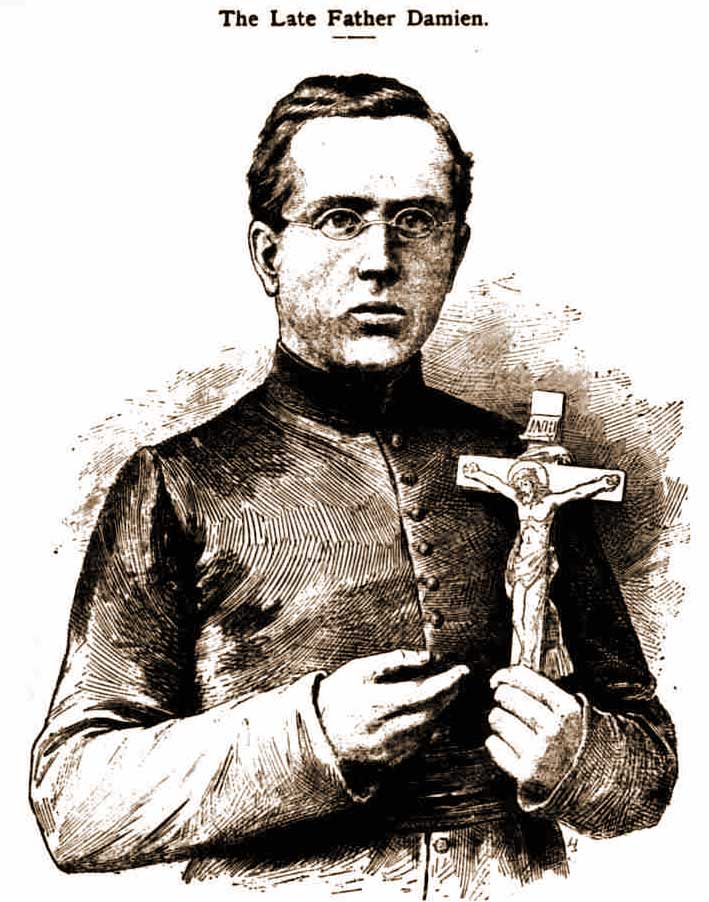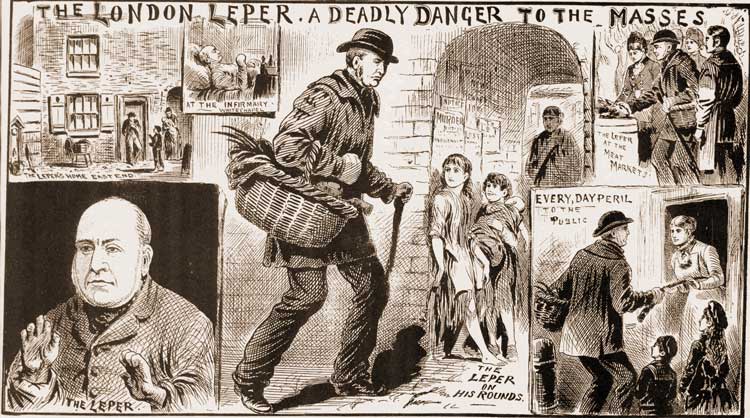Father Damien (1840 – 1889) was a Roman Catholic priest from Belgium who, from 1873 to his death on 15th April 1889 (which is now Father Damien Day), led a mission for lepers in the Hawaiian Kingdom.
In December 1884, as he was preparing to take a bath, Father Damien put his foot into scalding water. Although this caused his skin to blister, he actually felt no pain, and he realised that he had contracted leprosy himself.
He died of the disease, aged 49, at 8am on the 15th April, 1889.

THE FATHER DAMIEN MEMORIAL
In June, 1889, a committee was established in London to promote the establishment of a fund to raise a memorial to the saintly priest, and the inaugural meeting, presided over by the Prince of Wales, was held at Marlborough House on Monday, 17th June, 1889.
During his speech, the prince made reference to the fact that a leper, with his hands distinctly affected by the disease, was, “at present, engaged in business at a London meat market.”
The Prince’s statement caused a great deal of press consternation, and, in the days that followed, they published articles under headlines such as, “The Leprosy Scare In London”, “Terror of Leprosy In London”, “Leprosy and the London Meat Supply”, and “Leper At A London Meat Market.”
They also set about finding out who the leper in question was and at which market he was working.
The Central Somerset Gazette was one that several newspapers to reveal his identity in its edition of Saturday, 29th June, 1889:-
THE LEPROSY SCARE IN LONDON
“The startling statement which the Prince of Wales made the other day when addressing the committee that is promoting a memorial to Father Damien, that ”at this very moment there is a leper, with his hands distinctly affected by the disease, engaged at his business in one of the large London meat markets,” has excited a great sensation in London.
Investigations have been made at the various meat markets in the metropolis, and it seems that the person referred to by his Royal Highness is a man named Edward Yoxall, who is about 64 years of age.
A SERIOUS DANGER TO THE PUBLIC
Dr. Herbert Larder, medical superintendent of the Whitechapel Infirmary, says Yoxall has been under his care on and off during the past two years, and when not in the infirmary he earns his living by buying ox-tails, sheep’s beads, and other meat in the Central Meat Market, Smithfield, and then, carrying them in a basket, sells them in retail to the poor of Hoxton and other districts.
He is suffering from a form of leprosy not recognisable by the ordinary observer, but his hands and feet are affected with ulceration, and in Dr. Larder’s opinion it is a serious danger to the public that this man should be allowed to handle and sell meat as he is now doing.
He is a married man with six children, none of whom are affected with the disease.
It is difficult to believe that a man in a terribly advanced stage of leprosy should have been permitted to handle meat of any kind which was intended for consumption, but the man’s own admissions show that for years past up to the present time this has been the case.

HIS LIFE STORY
It appears that he has spent about one-third of his time in the infirmary, coming in for two or three months at a time and going away again when he felt sufficiently well to resume his occupation.
He was born in London. His parents were never out of England. As a young man he went to sea, and, in his different voyages, he visited several ports in the Baltic, and Malta, Corfu, and other ports in the Mediterranean Sea.
Thirty-five years ago, he abandoned his seafaring career and settled down permanently in London, where he became a butcher and meat salesman.
Shortly after leaving the sea, he married. His wife is yet living, and, as has been stated, he has six grown-up children. He followed the occupation of a butcher till some five or six years ago, when symptoms of his dreadful disease first began to develop themselves.
HE BECAME A BUTCHER
For 18 years of that earlier period, he had permanent employment in the shop of a butcher in Whitecross-street. He was then compelled to abandon his occupation, and he has since gained his livelihood in the manner described, hawking meat in a basket.
The unfortunate man in his present condition presents a piteous spectacle, and it is almost incredible that he should be able to perform work of any kind.
The fingers of the right hand are almost entirely gone, whilst those of the left are in a permanently “clawed” condition. The hands, in fact, present the appearance of small pieces of flat board. The feet are in a horrible state, being covered with open sores. There is also an open sore on one hand.
AN INTERVIEW WITH DR. ABRAHAM
A reporter has had an interview with Dr. P. Abraham, by whom the man was exhibited at the last meeting of the Epidemiological Society, with a view to obtaining his opinion as to what possible consequences might arise from the handling of meat intended for human consumption by a leprous subject.
Dr. Abraham said that he was glad to have the opportunity of giving an opinion which might allay any public feeling of uneasiness in this matter. He did not think it possible that the patient could have handled the meat very much, as his hands were in such a condition that it was almost impossible for him to use them. It was, of course, not a pleasant thing to think cf this unfortunate man carrying meat round for sale, but it was a good deal a matter of sentiment.
There were hundreds of cases of persons being in close daily contact with lepers for years and not contracting the disease.
In this case the man had been abroad amongst the public for years, and nobody had caught the disease from him. Neither had anybody caught it from the boy “H. S.” who is at present in the Whitechapel Infirmary.
The atrophic leprosy from which this man Yoxall suffers is much less contagious, Dr. Abrahams thinks, than other forms of the disease. As a matter of fact, there has been only one authenticated case in the United Kingdom of a patient contracting the disease by contagion. That was the case of a patient of Dr. Benson’s in Ireland.
Dr. Abraham, in conclusion, said that he had no doubt that Yoxall would be prohibited from following his occupation any longer, and that he would be suitably provided for. As the case stood, however, there was not in his opinion any ground for public alarm.
STEPS TAKEN TO PREVENT HIM HAWKING MEAT
The public will hear with satisfaction that steps have already been taken to prevent Yoxall from pursuing further his calling of a meat hawker.
Yoxall presented himself at the Whitechapel Infirmary on Friday morning for treatment, as he is now suffering from one of his bad attacks, and it has been decided to retain him for the present at that institution.
It is understood that the Prince of Wales is taking much interest in the matter, and is extremely anxious that Yoxall shall not suffer from the publicity given to his case.
It is understood that, when the arrangements connected with the “Father Damien Memorial Fund” are carried out, Yoxail will participate in its benefits, but, in the meantime, his Royal Highness desires to shield him from want, and with this object in view has sent a cheque to Mr. Frank Harris, the hon. secretary of the Executive Committee, with a request that such steps shall be taken as shall seem needful in order to relieve Yoxall’s immediate necessities.”
